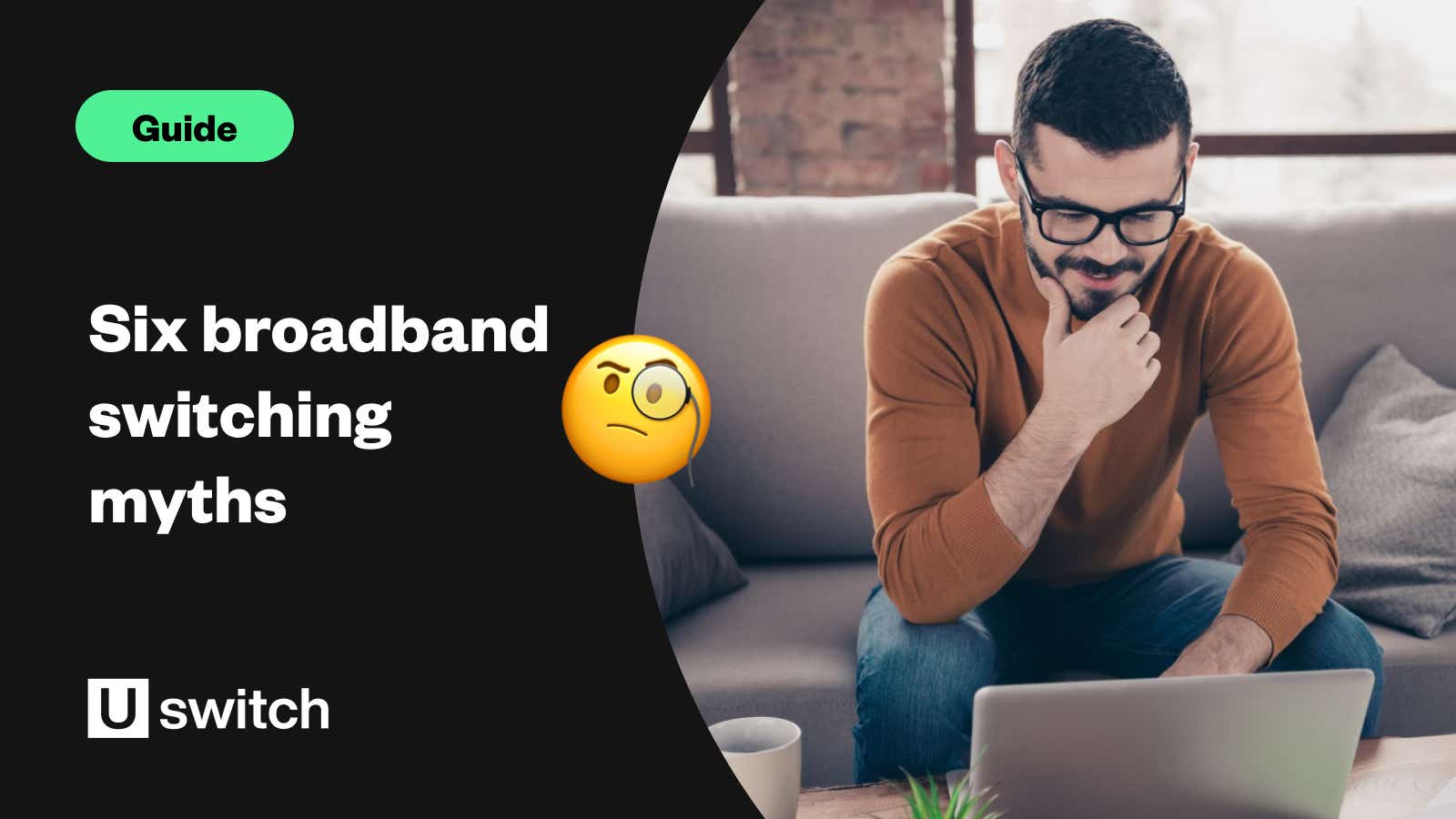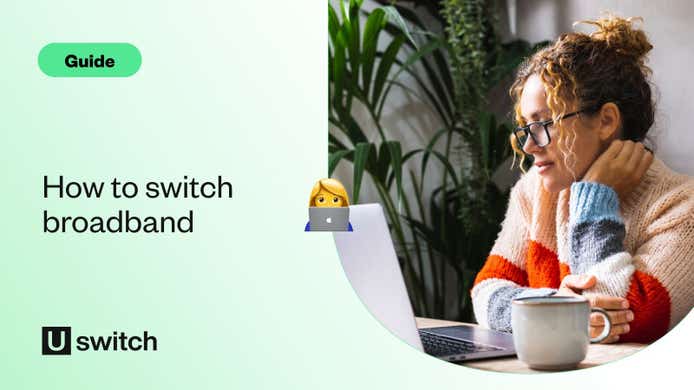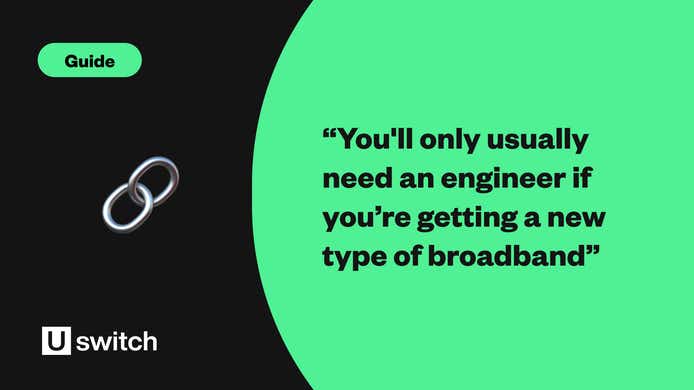We talk about switching your broadband provider quite a lot (it’s kind of what we do), and we know that consumers who regularly compare and switch tend to get the best broadband deals available.
So what’s keeping so many UK households from switching and saving themselves money? Here are six myths about switching broadband providers that you may have thought about and why they're just not true.
1. It’s too much hassle to switch
Probably the biggest myth surrounding switching broadband is that it’s too much of a hassle.
In reality, switching broadband has only become easier over the years.
If you haven’t switched in a while, you no longer have to worry about reaching out to your provider to cancel and arranging when one service stops and your new one begins.
These days, thanks to a new service called One Touch Switch, switching broadband is entirely led by your new provider. So you only need to contact them to arrange the start and end dates of your broadband connection, and they will organise the rest with your old provider.
2. Will I lose internet access when I switch?
Back in the early days of broadband, the switching process was long and complicated, which often left users without a working broadband connection for days.
With broadband very much an essential utility these days, going without an internet connection is unthinkable to many of us.
A typical switch may still result in a short loss of service, but it’s a matter of minutes rather than days.
On the day your switch is scheduled to take place, you likely won't notice much of a difference when it transfers over. The only time could lose your connection is if you're getting a new type of broadband installed, like full fibre. But the improved speed and reliability you'd get from it is almost always worth the short downtime.
3. There aren’t other providers in my area
Those of us living in less well-connected areas might struggle to find a new broadband provider to switch to.
Certain locations across the UK have historically only ever had one broadband provider available, meaning residents don’t have any choice when it comes to which provider they want to sign up to.
However, there are now a huge number of smaller broadband providers, known as 'altnets', that have received government funding to establish a network in rural areas. The rollout of these providers over the last few years has been rapid - so you might find that you have a lot more choice now.
To see if any are available where you live, check on comparison sites like Uswitch to see what services are available in your postcode. With new connections being made all the time, you might have more choices available to you than you realised.
Broadband postcode checker
See what internet speeds are available and compare prices for any postcode in the UK.
4. I'm worried I'll get stuck with slower broadband speeds
Slow broadband speed and poor/unreliable connections are the two biggest causes of dissatisfaction for broadband users.
The quest for a better-connected Britain has meant that massive improvements have been made in terms of access to superfast broadband throughout the country.
In fact, according to our Ofcom, 98% of UK premises have access to some level of fibre broadband connection. Meaning they can get a superfast connection of at least 30Mbps if not much faster.
Providers who’ve agreed to this code are required to share more information about broadband speeds with customers entering into new contracts, including bespoke speed estimates and a guaranteed minimum speed.
If your broadband speed ever drops below your guaranteed minimum, your provider has to fix it within 30 days. After that time, you have the right to exit your contract penalty-free if the issue hasn’t been resolved.
Even better, full fibre is now available to nearly two-thirds of UK homes. So you could almost guarantee yourself an upgrade in your connection if you choose to move onto one of those from a part-fibre, part-copper option.
If you’re unhappy with your current broadband connection, check your current internet speed with our broadband speed test and see if there are faster, more reliable services available in your area.
5. Fibre broadband is too expensive
Despite the widespread availability of fibre broadband, around 750,000 premises in the UK still lack a superfast broadband connection.
Thanks to the increasing availability of superfast connections, the cost of these connections has come down substantially. Nowadays, you can sometimes find fibre broadband deals starting from just £20 per month, and these deals can get even better in popular sale periods like Black Friday.
If you’re out of contract with your current broadband provider, then you’re almost assuredly paying a higher monthly rate than this. According to our own research on broadband prices, the average customer out of contract on an ADSL connection is paying £32 per month, which is more expensive than getting a faster, more reliable fibre connection.
6. My provider is giving me the best deal
You likely did plenty of shopping around when you last signed up for broadband to make sure you got the very best deal. Therefore, it makes sense that the best deal for you then is still the best deal for you now, right?
However, your monthly bill likely jumped significantly once your contract ended.
Ernest Doku - “Broadband customers typically face steep price hikes at the end of their contracts. Most broadband contracts last for 12 or 18 months, and at the end of that time, we found that they can face monthly prices increase from 39% to 63%, depending on the provider and deal.”
Thankfully, Ofcom regulations now require broadband providers to inform customers that their contracts are ending and let them know in writing what their new monthly costs will be.
Check your broadband contract to see when it ends. If you’re not under contract, you can likely find cheaper, faster broadband deals elsewhere.
Browse our range of fibre broadband deals
Choose between our wide range of fibre broadband deals on Uswitch.
Still in contract?
If you're looking to switch broadband but still have some months left to go on your contract, it's best to see it through until it finishes. But we can help.
Provide us with your contract end date and address, and we'll send you a handy reminder with some deals available to your home when you're able to switch without charge.
Broadband renewal reminder
Tell us your contract end date and we'll remind you to save
Contract end date
Get reminders to find a better deal when your contract is ending. We may use your address and current provider to show you relevant deals. Terms and conditions apply. Privacy notice.





